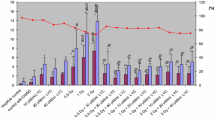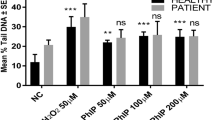Summary
Background: Many epidemiological studies have identified a protection against cancer associated with consumption of fruit and vegetables. One factor is this protection may be the enhancement of cellular DNA repair activity by micronutrients, such as carotenoids, found in these foods.
Aims of the study: To measure the capacity of lymphocytes isolated from volunteers supplemented with β-carotene, lutein or lycopene to recover from DNA damage induced in vivo by treatment with H2O2.
Methods: Healthy volunteers were given supplements of lutein (15 mg/day), lycopene (15 mg/day) and βcarotene (15 mg/day), each for 1 week, the supplementation periods being separated by 3-week wash-out periods. Blood samples were taken at the beginning and end of each supplementation, and at 1 week and 3 weeks during the wash-out period. Carotenoid levels were measured in plasma. Lymphocytes were isolated and frozen. Subsequently, they were treated with 100 μM H2O2 and incubated for up to 24 h; DNA damage was measured with the comet assay (single cell gel electrophoresis) after 0, 2, 4, 8, and 24 h.
Results: Increases of 2- to 3-fold in mean plasma lutein and β-carotene concentrations were seen at the end of the respective supplementation periods; they returned virtually to basal levels after wash-out. Lycopene concentrations were less affected by supplementation, and were more variable. H2O2-induced DNA strand breaks were apparently only slowly rejoined by the lymphocytes. The rejoining of breaks in the first few hours appeared substantially faster in lymphocytes following supplementation with β-carotene, but no such effect was seen with lutein. In those individuals who showed increases in lycopene concentrations, the recovery was significantly faster. Lymphocytes that were not treated with H2O2 showed a transient increase in DNA breakage to about double the background level in 2 h, presumably as a result of exposure to atmospheric oxygen; this effect, too, was relieved by supplementation with lycopene or β-carotene.
Conclusions: While certain carotenoids appear to enhance recovery from oxidative damage, this is probably in fact an antioxidant protective effect against additional damage induced by atmospheric oxygen, rather than a stimulation of DNA repair.
Similar content being viewed by others
Author information
Authors and Affiliations
Additional information
Received: 6 December 1999, Accepted: 22 March 2000
Rights and permissions
About this article
Cite this article
Torbergsen, A., Collins, A. Recovery of human lymphocytes from oxidative DNA damage; the apparent enhancement of DNA repair by carotenoids is probably simply an antioxidant effect. Eur J Nutr 39, 80–85 (2000). https://doi.org/10.1007/s003940050006
Issue Date:
DOI: https://doi.org/10.1007/s003940050006




